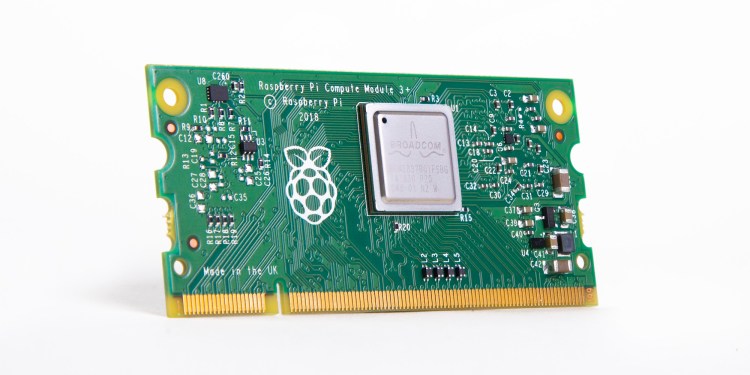The Raspberry Pi Foundation is adding a new device to its suite of miniature computers for industrial and enterprise customers. The charity today unveiled the Pi Compute Module 3+ (CM3+), successor to the two-year-old Compute Module 3 (CM3). The Pi Compute Module 3+ comes in four variants, starting at $25.
The Raspberry Pi Compute Module is derived from the CM3 board but offers better thermal behavior under load. That’s possible because of the Broadcom’s 64-bit BCM2837B0 application processor, which was also used in last year’s Raspberry Pi 3B+, and 1GB of LPDDR2 RAM. The CM3+ draws heat away from the processor faster than the CM3 and is rated to support temperatures between -20°C and 70°C (-4°F and 158°F).
The foundation says it has capped the clock speed of the processor at 1.2GHz, rather than the 1.4GHz offered on Pi 3B+, due to power supply limitations. The Compute Module 3+ is the last in a line of 40nm-based Raspberry Pi Products. On the sidelines of today’s announcement, the foundation said it no longer recommends the CM1, CM3, and CM3 Lite products for new design. The CM3+, which is now on sale in multiple markets, will be available until at least January 2026.
The difference between the four variants resides in their storage limits. The CM3+ Lite does not offer a built-in eMMC Flash, whereas other variants include 8GB ($30), 16GB ($35), and 32GB ($40) of eMMC Flash. These eMMC flash chips are more reliable and robust than normal SD cards, the foundation claims.
June 5th: The AI Audit in NYC
Join us next week in NYC to engage with top executive leaders, delving into strategies for auditing AI models to ensure fairness, optimal performance, and ethical compliance across diverse organizations. Secure your attendance for this exclusive invite-only event.
“Our aim for the Compute Module was to deliver the core Raspberry Pi technology in a form factor that allowed others to incorporate it into their own products cheaply and easily,” said James Adams, COO of Raspberry Pi Foundation, in a blog post. Unlike standard Raspberry Pi models, the Compute Module lineup is aimed at enterprise companies, such as set-top box vendors.
“If someone wanted to create a Raspberry Pi-based product but found the Model A or B Raspberry Pi boards did not fit their needs, they could use a Compute Module, create a simple low-tech carrier PCB, and make their own thing,” Adams added.
The Raspberry Foundation also unveiled the Compute Module 3+ Development Kit, which includes one lite variant of the miniature computer, a variant with 32GB eMMC flash, and a CM IO board, camera and display adapters, jumper wires, and a programming cable. You can read detailed technical specifications for all the variants on the foundation’s documentation site (PDF).

